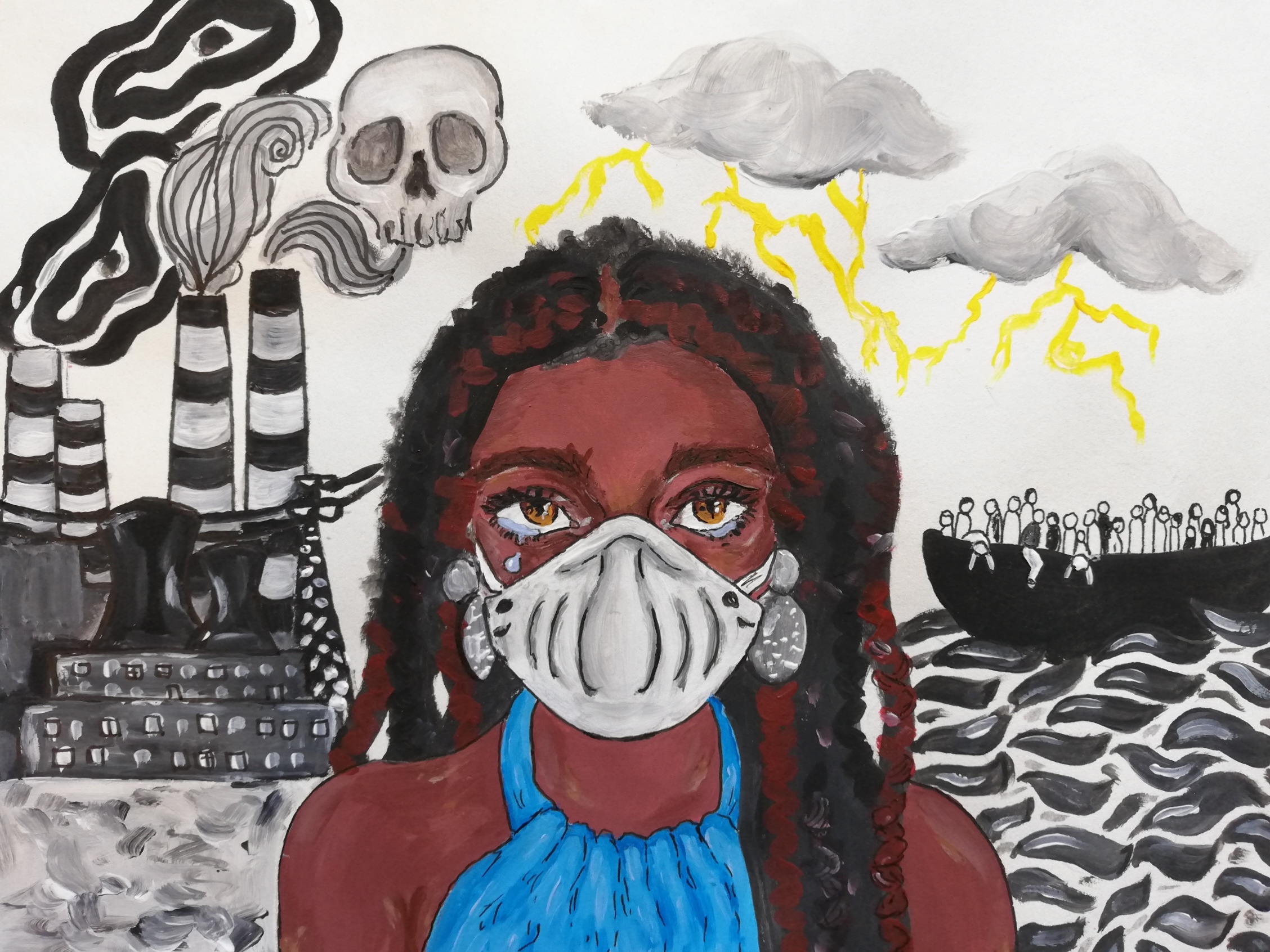Climate change and racial inequality have both garnered mass critical attention in recent decades. Following the death of George Floyd in 2020, the US saw a resurgence of the Black Lives Matter movement. The impact of Covid-19 on racial minorities globally has further highlighted racial injustice that persists in contemporary society; the U.S. saw a disproportionate amount of deaths during the pandemic amongst Black and Indigenous communities, and although the vaccine rollout has just begun, there is already striking evidence of the racial and ethnic disparities in vaccine allocation. Environmental and climate discourse has taken a backseat amidst the pandemic, despite it remaining an issue of growing concern, with reportedly a mere nine years left to prevent irreparable damage caused by climate change. Climate justice frames climate change as a political issue, not only a purely physical one, in order to safeguard underprivileged cohorts who are most vulnerable to the adverse socio-economic impacts arising from it. This environmental movement strives to fight for racial minorities who feel the greatest impact of climate change. However, the rise of other insidious movements such as eco-fascism instead attempts to shift the blame onto marginalised groups. So-called eco-fascists blame environmental demise on issues such as immigration and overpopulation. However, it is clear that racial and climate justice are intrinsically linked.
In times of crisis, the poorest margin of the population consistently endures the most suffering and hardship. As seen with the Covid-19 pandemic, racial minorities once again bear the brunt of crisis-induced consequences due to systemic racism that continues to enforce barriers to education, thus stunting intergenerational economic progression. Similarly, the climate crisis has left many on the fringes of society with no choice but to migrate because of the unpredictable climate which can no longer support their subsistence farming practices. Poorer Black communities are disproportionately vulnerable to devastation caused by climate hazards including flooding and natural disasters such as hurricanes due to their geographical locations. Communities of colour are more likely to be located near toxic facilities. For instance, Louisiana’s “Cancer Alley” is home to predominantly people of colour, and the abundance of petro-chemical plants in the area have proven to dramatically shorten the lifespan and reduce quality of life for those who live there. Environmental racism is a double-edged sword; not only are poor Black communities disadvantaged by their location, but the majority of them also do not have access to the necessary medical care. Evidence of racial disparities in disaster recovery aid prioritisation further sheds a light on the inequalities that make Black Americans more susceptible to the threats posed by environmental disaster.
“As climate change continues to accelerate, large numbers of climate refugees will be left with no choice but to flee their home countries.”
In recent years, Europe has seen a large number of climate refugees, the number of which will only continue to increase. Research has shown that climate change significantly contributes to political instability and conflict, creating a major push factor for climate refugees. Higher temperatures and extreme weather conditions such as droughts and flooding dramatically worsen economic outcomes within a country and exacerbate social unrest, which can incite an increase in violence. For instance, flooding can cause the spread of deadly water-borne diseases, thus putting enormous pressure on already weak healthcare systems. Countries nearest to the equator feel the greatest effects of global warming, making them increasingly susceptible to the negative economic impacts resulting from unpredictable weather conditions. A 2013 research paper, Quantifying the Influence of Climate on Human Conflict, found that changes in temperature of one standard deviation correlated with a 4% increase in interpersonal conflict rates, and a 14% increase in the rate of intergroup conflict. Evidently, climate change and political conflict are connected, and as climate change continues to accelerate, large numbers of climate refugees will be left with no choice but to flee their home countries.
This is an inevitable situation that Ireland urgently needs to prepare for. The country’s current system of institutionalised living for asylum seekers, Direct Provision, is fatally flawed. Direct Provision was introduced in 2000 to temporarily provide incoming asylum seekers with hostel-like accommodation for a period of up to six months, after which they would transition to independent living. According to Doras, the average time spent living in Direct Provision is, in fact, two years, with many stuck in DP for far longer. The standard of living in these centres has been described as inhumane; overcrowding, lack of privacy, and nutritionally inadequate meals are among some of the problems faced by those who live there. Today, there are over 7000 people living in Direct Provision.
“The current system of institutionalised living in Ireland is not a sustainable solution and it is crucial that there are suitable supports in place for asylum seekers in years to come.”
The current system of institutionalised living in Ireland is not a sustainable solution and it is crucial that there are suitable supports in place for asylum seekers in years to come. Long-awaited State plans to reform the system have emerged recently in the form of a White Paper on ending Direct Provision published by the Department of Children and Equality, which proposes a two-stage “blended” accommodation system. The Department aims to have this up and running by the end of 2024, but only time will tell if these plans will materialise by then, and if the new system will prove to be an effective alternative. More than ever, it is vital that the current system is completely and radically overhauled at an accelerated pace. The prioritisation of creating a better refuge system in Ireland is imperative to accommodate asylum seekers that will arrive here in our not-so-distant future.






